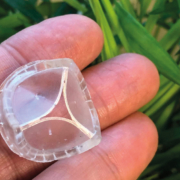Scientists develop new heart valve with improved biocompatibility and durability
Biotech scientists have developed a new polymeric heart valve, called the PoliValve, with a life span potentially longer than current artificial valves.
The PoliValve will also prevent the need for the millions of patients with diseased heart valves to require life-long blood thinning medication.
There are two artificial valves currently available for patients with diseased heart valves; both have limitations either in durability or in biocompatibility. Biological valves are made from fixed pig or cow tissue and have good biocompatibility, but limitations in durability of 10 to 15 years. Mechanical valves have very good durability, but poor biocompatibility and patients must take daily blood thinning drugs to prevent blood clots.
The PoliValve, created by Prof. Geoff Moggridge, Dr Marta Serrani and Dr Joanna Stasiak at Cambridge’s Department of Chemical Engineering and Biotechnology, and Prof. Raimondo Ascione, Head of the Translational Biomedical Research Centre (TBRC) at the University of Bristol, is made from a special co-polymer and is designed to resemble the flexibility, biocompatibility and durability of a natural heart valve. They have spent three years conducting developmental work and extra-vivo and in-vivo testing on the new PoliValve.
The device combines excellent durability with biocompatibility, addressing the limitations of current biological and mechanical artificial valves. It is made through a simple moulding process; hence it also reduces markedly manufacture and quality control costs.
Initial testing in animal has been undertaken at Bristol’s TBRC facility as a first mandatory in-vivo testing step to ensure safety. Long-term in-vivo testing is already planned and funded as a necessary additional step before bringing it to market.
According to the ISO standards a new artificial heart valve must withstand a minimum of 200 million repetitions of opening and closing during bench testing (equivalent to five-year life span) to be tested in humans. The new Cambridge- Bristol polymeric valve has comfortably surpassed this.
Prof. Ascione noted: “The transformational PoliValve results from an advanced Bristol/ Cambridge-based biomedical cross-fertilisation between experts in biomaterials, computational modelling, advanced preclinical development/ testing and clinical academics understanding the patient needs. The new valve could help millions of people worldwide and we aim to test in patients within the next five years.”


